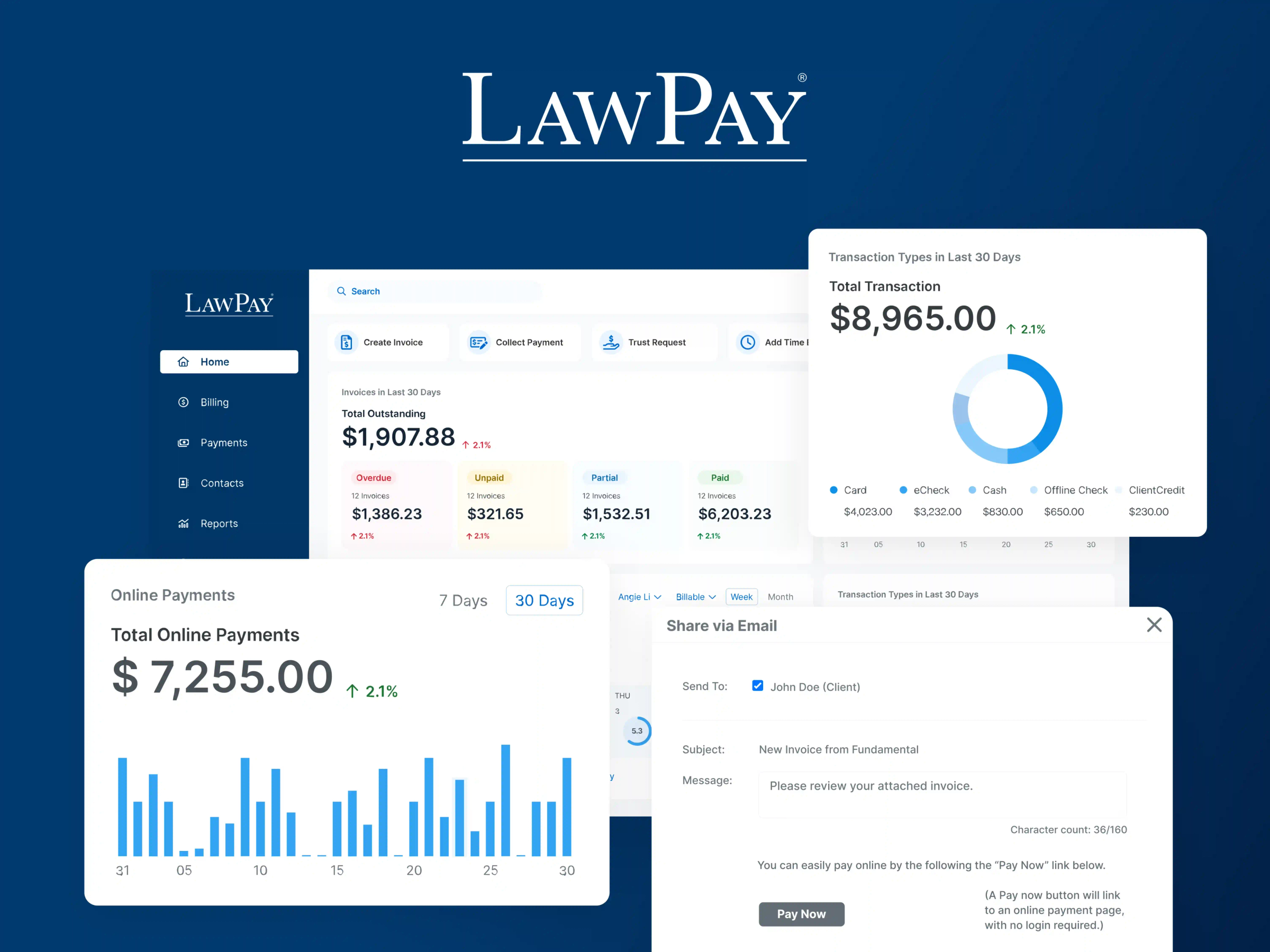Key takeaways
The average lawyer's hourly rate typically falls between $162 and $392, giving law firms a reliable baseline for setting their fees.
Retainer fees depend on practice area, with bankruptcy and family law lawyers often requesting the highest retainers, while immigration practices tend to have lower averages.
While hourly billing is most common, alternatives like retainers, contingency fees, and flat fees can be used depending on case type and client needs.
Accurate time and expense tracking is essential whether charging hourly, flat, or contingency fees. Detailed records help validate pricing, improve profitability, and build client trust.
Legal clients want clarity about costs before committing to representation, which makes transparent pricing a crucial part of earning their trust and securing new business.
For many firms, that transparency begins with providing an hourly rate estimate. The right rate depends on several factors—your practice area, level of experience, reputation, and location. Setting that number can feel challenging, but understanding the current market helps ensure you’re not undervaluing your work or pricing yourself out of reach.
This guide will cover the average hourly rates and retainer fees for U.S.-based lawyers, common fee arrangements, key factors for determining rates, and additional tips to improve your law firm’s billing system.
Average lawyer hourly rates by state
The table below documents the average lawyer's hourly rate by state, (including Washington D.C.) in 2023, as reported by Statista. Rows designated with “-” indicate data that wasn’t available.
State | Average Hourly Rate 2023 | Average Hourly Rate 2022 |
|---|---|---|
Alabama | $208 | $211 |
Alaska | - | - |
Arizona | $266 | $268 |
Arkansas | $242 | $248 |
California | $344 | $358 |
Colorado | $261 | $271 |
Connecticut | $342 | $350 |
Delaware | $344 | $358 |
District of Columbia | $392 | $424 |
Florida | $297 | $303 |
Georgia | $286 | $288 |
Hawaii | - | - |
Idaho | $233 | $192 |
Illinois | $305 | $235 |
Indiana | $242 | $314 |
Iowa | $202 | $251 |
Kansas | $227 | $248 |
Kentucky | $204 | $216 |
Louisiana | $245 | $250 |
Maine | $193 | $195 |
Maryland | $310 | $319 |
Massachusetts | $285 | $290 |
Michigan | $266 | $269 |
Minnesota | $271 | $274 |
Mississippi | $217 | $225 |
Missouri | $249 | $254 |
Montana | $199 | $213 |
Nebraska | $218 | $219 |
Nevada | $311 | $318 |
New Hampshire | $248 | $256 |
New Jersey | $306 | $330 |
New Mexico | $242 | $244 |
New York | $358 | $378 |
North Carolina | $254 | $262 |
North Dakota | $253 | $268 |
Ohio | $224 | $238 |
Oklahoma | $235 | $230 |
Oregon | $255 | $263 |
Pennsylvania | $288 | $290 |
Rhode Island | $240 | $238 |
South Carolina | $249 | $259 |
South Dakota | $199 | $189 |
Tennessee | $233 | $247 |
Texas | $300 | $313 |
Utah | $250 | $260 |
Vermont | $226 | $235 |
Virginia | $295 | $304 |
Washington | $288 | $296 |
West Virginia | $162 | $168 |
Wisconsin | $231 | $251 |
Wyoming | $241 | $266 |
Key insights
Based on the data above, lawyer costs can vary significantly in different parts of the U.S.
Consider the following:
Average lawyer hourly rates around the country range from $392 to $162.
In 2023, the median hourly rate was $249 and the average was $257.
West Virginia had the cheapest average lawyer hourly rate in 2023.
Washington D.C. had the highest average hourly rate in 2023 of all U.S. states and regions, followed by New York.
Some average lawyer hourly rates changed over time. Lawyer rates grew more than 20% in Illinois and Idaho while they dropped nearly 20% or more in Iowa and Indiana.
Keep these data points in mind as you set your law firm’s pricing and hourly rates. For example, you may have a harder time commanding a New York rate if you live in Vermont.
What is the average lawyer retainer fee?
The average lawyer retainer fee ranged from $1,973 to $4,015 in 2023, according to our 2024 Benchmark Report Part 1: Law Firm Finances. We break down these averages by practice area below:
Practice Area | Retainer Amount Requested |
|---|---|
Bankruptcy | $4,015 |
Family Law | $3,163 |
Real Estate | $2,860 |
Employment | $2,835 |
Criminal Law | $2,816 |
Matrimonial | $2,710 |
Trust and Estate (includes Probate) | $2,172 |
Immigration | $1,973 |
Case complexity and executed services can vary between practice areas. We recommend using these averages as a starting point when considering your retainer fees.
Law firm rates by field of law
Just as geography affects law firm rates, so too does where a lawyer practices. The following information from 8am™ MyCase highlights the five states, territories, and major cities with the highest average hourly rates, based on practice area. We also include law firm rate information for major cities across the U.S.
Criminal law
State/U.S. territory | Rate |
|---|---|
Nevada | $578.93 |
Washington, D.C. | $399.19 |
New Jersey | $393.71 |
Guam | $315.38 |
Rhode Island | $310.89 |
Major City | Rate |
|---|---|
Phoenix | $261.85 |
LA | $152.11 |
Seattle | $250.00 |
Boston | $293.95 |
NYC | $272.08 |
Chicago | $250.34 |
Dallas | $233.93 |
Denver | $249.96 |
Houston | $260.97 |
Miami | $349.17 |
Philadelphia | $139.07 |
San Francisco | $383.98 |
Family law
State/U.S. territory | Rate |
|---|---|
Delaware | $411.48 |
Connecticut | $340.46 |
California | $340.09 |
Nevada | $331.49 |
New Jersey | $331.45 |
Major City | Rate |
|---|---|
Phoenix | $260.78 |
LA | $336.69 |
Seattle | $210.72 |
Boston | $167.27 |
NYC | $367.15 |
Chicago | $281.12 |
Dallas | $280.18 |
Denver | $247.43 |
Houston | $320.75 |
Miami | $284.38 |
Philadelphia | $255.40 |
San Francisco | $327.86 |
Matrimonial
State/U.S. territory | Rate |
|---|---|
Delaware | $389.41 |
Nevada | $371.36 |
New Jersey | $366.58 |
New York | $365.09 |
Arizona | $359.68 |
Major City | Rate |
|---|---|
Phoenix | $375.25 |
LA | $347.67 |
Seattle | $267.89 |
Boston | $255.67 |
NYC | $399.85 |
Chicago | $290.42 |
Dallas | $299.38 |
Denver | $290.27 |
Houston | $318.98 |
Miami | $324.39 |
Philadelphia | $267.52 |
San Francisco | $244.18 |
Trusts and estates (includes probate)
State/U.S. territory | Rate |
|---|---|
Maryland | $391.80 |
Nevada | $379.90 |
Hawaii | $369.55 |
California | $354.73 |
New York | $334.26 |
Major City | Rate |
|---|---|
Phoenix | $262.95 |
LA | $352.97 |
Seattle | $218.83 |
Boston | $375.21 |
NYC | $386.23 |
Chicago | $339.46 |
Dallas | $345.53 |
Denver | $274.05 |
Houston | $320.12 |
Miami | $268.93 |
Philadelphia | $226.38 |
San Francisco | $341.43 |
Immigration
State/U.S. territory | Rate |
|---|---|
Kentucky | $400 |
Minnesota | $392.38 |
New York | $383.33 |
Rhode Island | $350.00 |
Colorado | $336.00 |
Major City | Rate |
|---|---|
Phoenix | $285.12 |
LA | $354.85 |
Seattle | $269.13 |
Boston | $197.50 |
NYC | $409.04 |
Chicago | $241.34 |
Dallas | $364.47 |
Denver | $222.41 |
Houston | $171.73 |
Miami | $298.54 |
Philadelphia | $198.32 |
San Francisco | $325.00 |
Bankruptcy
State/U.S. territory | Rate |
|---|---|
New York | $430.44 |
Washington, D.C. | $420.31 |
West Virginia | $369.94 |
California | $360.79 |
Arizona | $356.59 |
Major City | Rate |
|---|---|
Phoenix | $386.01 |
LA | $385.66 |
Seattle | $333.75 |
Boston | $465.17 |
NYC | $460.40 |
Chicago | $479.97 |
Dallas | $389.08 |
Denver | $235.03 |
Houston | $354.19 |
Miami | $268.98 |
Philadelphia | $300.17 |
San Francisco | $279.29 |
Personal Injury
State/U.S. territory | Rate |
|---|---|
Washington, D.C. | $595.25 |
Virginia | $585.33 |
Alabama | $578.72 |
Nevada | $488.90 |
Washington | $404.84 |
Major City | Rate |
|---|---|
Phoenix | $320.66 |
LA | $314.40 |
Seattle | $281.03 |
Boston | $295.24 |
NYC | $61.00 |
Chicago | $408.63 |
Dallas | $322.92 |
Denver | $246.63 |
Houston | $224.51 |
Miami | $290.77 |
Philadelphia | $390.07 |
San Francisco | $272.61 |
Real Estate
State/U.S. territory | Rate |
|---|---|
Nevada | $388.43 |
Delaware | $363.64 |
California | $350.87 |
Florida | $349.37 |
Washington, D.C. | $347.83 |
Major City | Rate |
|---|---|
Phoenix | $337.69 |
LA | $411.70 |
Seattle | $350.00 |
Boston | $280.83 |
NYC | $332.42 |
Chicago | $254.53 |
Dallas | $244.77 |
Denver | $253.87 |
Houston | $263.27 |
Miami | $313.92 |
Philadelphia | $337.22 |
San Francisco | $324.95 |
Employment
State/U.S. territory | Rate |
|---|---|
Delaware | $416.04 |
California | $381.64 |
Arizona | $376.06 |
Pennsylvania | $359.00 |
Virginia | $355.73 |
Major City | Rate |
|---|---|
Phoenix | $393.14 |
LA | $368.29 |
Seattle | $357.59 |
Boston | $277.45 |
NYC | $428.58 |
Chicago | $254.50 |
Dallas | $376.72 |
Denver | $277.18 |
Houston | $333.88 |
Miami | $305.31 |
Philadelphia | $401.53 |
San Francisco | $365.03 |
Civil
State/U.S. territory | Rate |
|---|---|
Guam | $392.89 |
Delaware | $390.31 |
Mississippi | $368.95 |
Washington, D.C. | $360.00 |
California | $352.27 |
Major City | Rate |
|---|---|
Phoenix | $270.97 |
LA | $383.43 |
Seattle | $326.47 |
Boston | $317.37 |
NYC | $368.25 |
Chicago | $296.43 |
Dallas | $366.11 |
Denver | $110.22 |
Houston | $271.82 |
Miami | $305.24 |
Philadelphia | $412.94 |
San Francisco | $422.71 |
The data reveals that some areas, like Washington D.C., California, and Delaware, command high rates in various practice areas. In other cases, a state may generally have lower rates but have one practice area with higher rates.
For example, West Virginia tends to have some of the lowest hourly rates in the country, but it has the third-highest hourly rate among bankruptcy attorneys.
What are common lawyer fee arrangements?
According to the American Bar Association (ABA), hourly billing is the most commonly used fee arrangement. However, your law firm can leverage several other attorney fee agreements.
Hourly fees
Hourly billing links your earnings to the time you put into a matter. The more hours your firm dedicates to a case, the higher the bill for the client—and the more revenue your firm brings in.
Pros | Cons |
|---|---|
Hourly rates are a more transparent method for tracking work performed | It is unpredictable how much revenue your firm will earn from each client |
It is easier to control the costs of servicing a client | Hourly billing can create inefficiencies as it incentivizes work to take longer rather than working more efficiently |
Retainer
A lawyer retainer fee is an upfront deposit a client pays before legal work begins. In most cases, the retainer is applied against the lawyer’s hourly billing as services are provided, but it can also cover other billing arrangements.
Pros | Cons |
|---|---|
Allow clients to guarantee a lawyer’s availability | Requires clients to be able to pay a large up-front payment |
A retainer agreement may come with overall cost savings for clients | It can be complicated to handle unused retainer dollars |
Contingency
Contingency fees are a charge based on the percentage of the amount awarded in a case. This structure is only appropriate for cases in which you can win. You won't get paid if your client receives no award or settlement.
In contingency relationships, you might require the client to pay certain expenses regardless of the outcome. These expenses are required to be outlined beforehand in the fee agreements. You could also use a sliding scale, with a fee percentage that varies based on how far the case went before settling.
Pros | Cons |
|---|---|
Customer-friendly pricing structure | If you don’t get a verdict or settlement, you will not receive any revenue |
The revenues law firms receive have the potential to be much larger than other pricing structures | Lawyers may need to be more selective when choosing which cases to take |
Flat fee
With a flat-fee structure, you bill clients a pre-determined rate for a specific service. For example, an estate planning firm may offer a fixed price for a simple will.
Pros | Cons |
|---|---|
Costs are predictable and transparent | More complex cases may not receive adequate compensation |
Efficient law firms are rewarded | Harder to control costs as unexpected complexities arise |
Once you settle on a pricing structure for your firm, consider offering different payment options for clients. One approach is to offer payment plans, giving more clients access to your services. Structured payment schedules can potentially increase revenue by making costs more manageable for clients.
What additional costs should lawyers charge to clients?
Lawyers may charge all case-related costs to their clients and include this term in their fee agreement. Additional costs may include filing fees, witness costs, and other expenses paid on behalf of the client. Before beginning work on a case, clearly explain all fees and confirm the client’s agreement to prevent billing issues later.
Below are examples of costs to include:
Legal research can cover any time your firm spends conducting research, as well as subscriptions to premium services like Westlaw.
Expert witnesses provide specialized services that can make or break a case. Expert witness fees compensate these individuals for their time.
Travel expenses can include mileage and hotels. When you need to travel long distances for hearings, depositions, or court appearances, they may include travel expenses in their bill.
Court filing fees are mandatory fees set by the court for filing motions, complaints, and appeals. Clients would pay these costs regardless of who their attorney is or even if they decided to self-represent.
Deposition fees are costs related to gathering sworn testimony from witnesses or experts. These fees may cover the services of a court reporter and transcript fees, among others.
Mediation fees cover the mediator’s fees for preparation, attending the mediation sessions, and travel or staff expenses.
Appellate fees include the additional filing fees, preparation expenses, and court costs that appear if a case is appealed. If the original agreement didn’t cover appeals, an attorney would further bill for these costs.
Laboratory fees cover the invaluable lab testing that can help strengthen a client’s case. As with anything in the medical and scientific areas, lab companies charge for their services and expertise.
Administrative fees are a catch-all for anything that doesn’t cover billable work or the categories listed above. This can range from printing services to postage and other office-related expenses.

What influences law firm rates?
Your field of law, level of experience, the average lawyer's hourly rate in your region, and the nature of the case can help you determine the right pricing for your firm.
Field of law
Not all lawyers bill top dollar. Our Benchmark Report found that bankruptcy and family law lawyers charge higher retainers than matrimonial and immigration lawyers.
Generally, highly specialized or technical lawyers can set higher hourly rates.
Local market rates
Your location defines the competition you face, the level of demand for your services, and prospective clients' income levels. The local cost of living and its impact on rent and wages also impact your rates.
For example, there may be no other lawyers nearby if you live in a rural area. But there may be a small pool of available clients who can afford your services.
Nature of the case
Your prices may also need to shift based on the complexity of your case. Consider the court appearances, legal research, and dedicated resources required for case preparation. Having multiple parties, jurisdictions, and witnesses can further complicate the case.
Experience and reputation of the lawyer
In general, more experienced attorneys can command a higher hourly rate than an attorney just starting out.
According to the U.S. Court of Federal Claims, lawyers with 20-30 years of experience charge $511 to $606 an hour on average. On the other hand, lawyers with less than four years of experience have average hourly rates of $182 to $212.
How can law firms improve the client billing process?
Law firms can improve the client billing process by simplifying it. For example, the most recent data from our 2024 Legal Industry Report found that 56% of law firms set up client payment plans. Of those who offered this, 48% were able to collect more over the course of a case.
Below are a few client billing best practices your law firm can keep in mind:
Be upfront with clients about costs, payment terms, and payment methods.
Have billing guidelines readily available for clients to access online.
Send itemized bills regularly and proactively check in with clients about invoices.
Offer multiple ways to pay, including card, eCheck, and ACH transfers.
Provide several payment options, including payment plans and legal fee financing.
Use law firm software to expedite billing, time tracking, and analysis to understand your firm’s financial health better.
Improve internal billing procedures to improve the overall client experience. Some ideas include conducting ongoing billing reviews and training staff on billing best practices.

Why is detailed time and expense tracking important?
Detailed time and expense tracking is foundational to your law firm's billing process. Without these, you'll struggle to manage your law firm’s billing process and grow your firm efficiently.
The typical legal invoicing practice is to bill in one-tenth of an hour increments. Many attorneys use a billable hours chart to support that effort. The chart converts minutes into an appropriate billing segment.
For example, you can determine that a six-minute phone call equals 0.1 billable hours.
To bill for that phone call, you’ll have to diligently log task start and end times, then record detailed, clear, and client-friendly task descriptions to use in legal invoices.
Ideally, you'd use law firm billing software like 8am™ LawPay, which automatically creates invoices from your time records. That way, you'd only write the descriptions once you complete tasks—rather than re-entering them in an invoice later.
You might wonder if skipping all that record-keeping and charging flat fees instead makes more sense.
Unfortunately, the answer is no.
Accurate time records are essential to running your law firm, no matter how you charge. Time records help you:
Document how you spend your time and reveal areas of inefficiency.
Validate or invalidate any flat fees you're charging.
Provide valuable talking points for client calls.
For example, let’s say you set a flat fee assuming 100 hours of work for a certain type of case. If time records show you're spending 125 hours on average, consider adjusting your fee schedule to remain profitable.
Get a better understanding of billing and pricing with LawPay
While different fee structures are available to you, effective law firm billing relies (in most cases) on an hourly rate and a reliable timekeeping system.
Many lawyers use technology to simplify timekeeping, like LawPay. This simple yet powerful law firm billing software supports time and expense tracking, billing and invoicing, trust account reconciliation, and client-friendly online payment options.
Linking time tracking with invoicing and payments makes it easy for law firms to create accurate and detailed invoices and accept payments while maintaining compliance with state bar guidelines.
Sign up today to learn more about how LawPay can help you manage and grow your law firm through accurate timekeeping and invoicing.
Schedule a demo to see what LawPay can offer your firm.
Get a demo
FAQ about the cost of a lawyer
About the author
Catherine Brock is a financial and fashion writer who’s been featured on BBC News, USA Today, MSN Money, Fox2 St. Louis, ABC7 Chicago, CBS2 Los Angeles, WGN Chicago, and WCPO Cincinnati. She also contributes regularly to Forbes.com and Yahoo Personal Finance. When she’s not picking top stocks, sharing budgeting advice, or shopping for clothes, you can find her riding a horse in the countryside.

